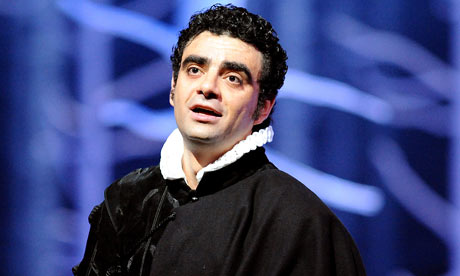
Operatic storylines – in my admittedly limited experience – offer unparalleled histrionic opportunities. Particularly the tragic ones. All that flinging oneself from battlements and dying of consumption – you'd think singers would find the time to plant a bit of premeditated pathos amid the coloratura.
But acting in opera logically takes second place to the ability to give the big aria some welly, and operatic acting conventions, as I've found to my bewilderment, differ considerably from those of the theatrical stage. Interaction between men (if friendly) consists of purposeful striding, back-slapping and an occasional shoulder-shake for emphasis (if hostile, it's the same thing, only more so, until somebody dies). Between women, the action is either bellicose – pushy-pushy, you stole my man – or sisterly, with a lot of stroking and cooing. Men and women either sing into each other's faces hard enough to ruffle their outlying hair (love) or spit angry phrases at each other from a circling distance, like irate geese (hate, coupled with desire for vengeance).
This is a repellently generalised and simplistic overview, but I'll stand by the statement that acting in opera too often consists of gestures, movements and expressions which can be performed by singers without distracting them from the glorious noise they're making, rather than those that would complement and make better sense of that glorious noise. It's still a toss-up, when you shell out your smackers for a seat at the Coliseum or Covent Garden, as to whether you'll be moved by by a subtle and intimate interpretation or have to rely on vocal virtuosity to help suspend your disbelief.
Sometimes that virtuosity, coupled with the joy of outrageous spectacle, is sufficient to carry all before it, as in the Royal Opera House's recent revival of Turandot, all enormous, mournful severed heads and green-masked executioners. It must be hard to concentrate on low-key pathos when you're a big bass sporting moustachios like the hair of Rapunzel or a sturdy baritone clad in candy-floss pink. The Zandra Rhodes-designed ENO production of Aida in 2008 took operatic facial hair to new depths – Radames's beard jutted aggressively from his chin like a follicular Smarties tube, which waggled when he sang, causing me repeatedly to disgrace myself. On the upside, I was much too busy watching his beard to pay any attention to his uninspired acting.
Sometimes, though, you get the lot. Last year's Les Contes d'Hoffmann featured a hero, the slim and charismatic Rolando Villazon, who could really act. He grew from a hot-blooded idealist into a grey-headed, cynical inebriate over the course of three acts and three doomed, disastrous love affairs. Hoffmann also featured, in Gidon Saks, a villainous bass-baritone who could over-act with magnificent shamelessness, announcing his presence with a big, booming pantomime baddy's "Ha! Ha! Ha!" and relishing the preposterous nature of his four wicked incarnations. He remained sinister, especially as Doctor Miracle who forces a consumptive girl to sing away her life, but his acknowledgement of inherent absurdity allowed me to respond with whole-hearted enjoyment rather than having to make baffled allowances for the "operatic".
Die Tote Stadt, on the other hand, could really have taken a leaf out of Hoffmann's book. Erich Wolfgang Korngold's 1920 account of a man gone a little awry, holed up in a "memory temple" with his dead wife's picture and a plait of her hair in a glass case, is fantastically surreal and perturbing, but this production featured all of the worst excesses of operatic acting. The anti-hero Marietta (Nadja Michael) spent most of the third act diving at the bereaved Paul like a vengeful kite, until it was almost a relief when he strangled her with wifey's wig. She sounded glorious, but Marietta is supposed to be a dancer – and to me she had all the instinctive grace of a dog dragging its bum along the ground. Mr G, the sensationally spine-crawling drama teacher in Chris Lilley's comedy series Summer Heights High, uses the baseball term "triple threat" to refer to kids who, like himself (as he sees it), can sing, dance and act with equal virtuosity. It's not necessary for every member of an operatic chorus to be a "triple threat". But there are some operas which require a greater than average fluency in acting and dancing of their leading singers, and Die Tote Stadt is one of them.
Many well-known theatre directors do a stint in opera, and often mastermind productions of enduring popularity – Anthony Minghella's Madame Butterfly is returning to the Coliseum in June and Nicholas Hytner's Magic Flute is there at present. These productions are notable for "theatrical spectacle", according to reviewers, but Minghella did say that he encouraged the singers to focus more on acting: "They fill up their lungs and they sing, then they move to the next location and they fill up their lungs and they sing ... The fact that they're in a conversation is the last thing they're asked to think about. We asked them to think about that, to see if it would change anything, and they were, like all artists, thrilled to be challenged."
I enjoy my occasional operatic forays a lot, but they would be even better if more directors presented their tenors and sopranos with that challenge.

